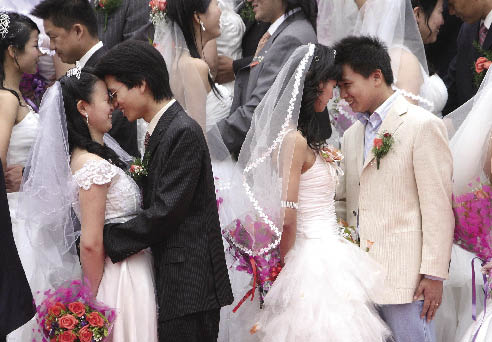| The "Budget Spouse" Phenomenon
By staff reporter LU RUCAI

Few days ago, Zhao Ying's friend introduced her to a man. A mediocre man she decided, but did not actually refuse to see him again. This marriageable 28-year-old used to place a high income and good looks first when evaluating a prospective spouse. Today, she tends to check out "ordinary Joe's" – in search of what's called the "budget husband."
Easy on the Wallet
"Budget husband" refers to the single man who is employed in a field with low risk of being unemployed or laid off, such as education and engineering. Their monthly income should range from RMB 3,000 to 10,000, an echelon that can afford the down payment on commercial housing. The budget husband concept is generated from the concept of "economically affordable housing," referring to projects for low- and middle-income groups that have been built in China for the past 11 years. More and more women now tend to seek a "budget husband" instead of a wealthy man, just as home buyers now cast about for a modest home rather than a villa.
Zhao Ying's candidate meets every one of the criteria in her budget hubby profile. He is a software engineer in a China-U.S. joint venture with a monthly salary of RMB 10,000. "He's been working there for ten years, with no fear of being laid off. That's a clear advantage compared to those who are currently feeling the pressure of the global financial meltdown. What's more, he owns an apartment in the suburbs." Zhao Ying is quite satisfied with him.
The "budget husband" has become a topic popular with more than just young singles. The drama Marry a Budget Husband has been well received in Beijing and Shanghai. The producer claims that the show is a "guide for the bachelorette who's decided to settle down."
The biggest matchmaking website on China's mainland, www.zhenai.com, reported on a survey it did in Feburary 2009, indicating men working in finance are now less popular due to the economic downturn. Instead, public servants, teachers and military men are more to women's liking. "Facing the current depression, Chinese women are eager for stability in life. That's why public servants rank first on their list." Li Song, board chairman of www.zhenai.com, explains.
Li Na, a housewife, is content that her husband works in a government department. Although not earning a fortune, he is never affected by financial ups and downs. Li says she "values a stable income and a peaceful life the most."
Uncomplicated and Family-Centerd
The "budget husband" isn't just an economic entity. In a woman's eyes, this temperate spouse is one free of bad habits such as drinking, smoking, and gambling. He is family-oriented, too. That might be a strict set of standards. However, it reflects a return to traditional marital values in this post-modern society.
The Social Survey Center of China Youth Daily found that opinions about what constitutes a successful man are changing. As high as 77.9 percent of the interviewees agree that "family-oriented" is the all-important measure of a man's success, followed at some distance by "responsibility to protect the family" (71.2 percent). "High social status" ranks far behind these first two criteria. Of the 2,469 interviewees, 52.3 percent were female and people in their 20s accounted for 65 percent.
| 